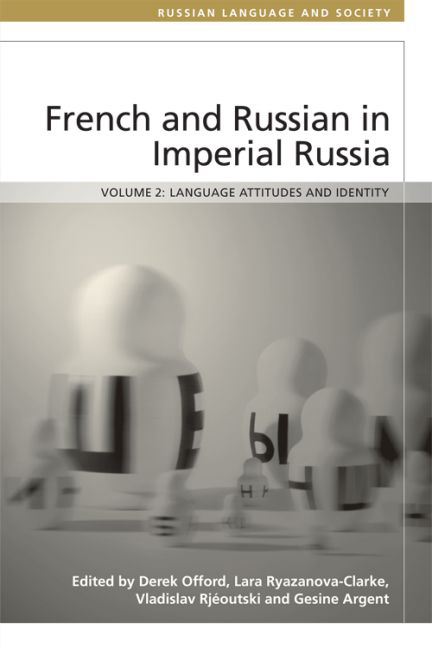Book contents
- Frontmatter
- Contents
- Preface
- Note on Dates, Transliteration and Other Editorial Practices
- Abbreviations Used in the Text, Notes and References
- Dates of Reigns in Eighteenth- and Nineteenth-Century Russia
- Dedication
- Introduction
- 1 The Pan-European Justification of a Multilingual Russian Society in the Late Eighteenth Century
- 2 Princess Dashkova and the Politics of Language in Eighteenth-Century Russia
- 3 Plating ‘Russian Gold’ with ‘French Copper’: Aleksandr Sumarokov and Eighteenth-Century Franco-Russian Translation
- 4 Francophone Culture in Russia Seen through the Russian and French Periodical Press
- 5 Linguistic Gallophobia in Russian Comedy
- 6 The Linguistic Debate between Karamzin and Shishkov: Evaluating Russian–French Language Contact
- 7 Language and Conservative Politics in Alexandrine Russia
- 8 Seduction, Subterfuge, Subversion: Ivan Krylov's Rewriting of Molière
- 9 The French Language of Fashion in Early Nineteenth-Century Russia
- 10 Russian ‘Translations’ of Patrie in the Napoleonic Period
- 11 Treatment of Francophonie in Pushkin's Prose Fiction
- 12 Love à la mode: Russian Words and French Sources
- Conclusion
- Notes on contributors
- Index
5 - Linguistic Gallophobia in Russian Comedy
Published online by Cambridge University Press: 25 October 2017
- Frontmatter
- Contents
- Preface
- Note on Dates, Transliteration and Other Editorial Practices
- Abbreviations Used in the Text, Notes and References
- Dates of Reigns in Eighteenth- and Nineteenth-Century Russia
- Dedication
- Introduction
- 1 The Pan-European Justification of a Multilingual Russian Society in the Late Eighteenth Century
- 2 Princess Dashkova and the Politics of Language in Eighteenth-Century Russia
- 3 Plating ‘Russian Gold’ with ‘French Copper’: Aleksandr Sumarokov and Eighteenth-Century Franco-Russian Translation
- 4 Francophone Culture in Russia Seen through the Russian and French Periodical Press
- 5 Linguistic Gallophobia in Russian Comedy
- 6 The Linguistic Debate between Karamzin and Shishkov: Evaluating Russian–French Language Contact
- 7 Language and Conservative Politics in Alexandrine Russia
- 8 Seduction, Subterfuge, Subversion: Ivan Krylov's Rewriting of Molière
- 9 The French Language of Fashion in Early Nineteenth-Century Russia
- 10 Russian ‘Translations’ of Patrie in the Napoleonic Period
- 11 Treatment of Francophonie in Pushkin's Prose Fiction
- 12 Love à la mode: Russian Words and French Sources
- Conclusion
- Notes on contributors
- Index
Summary
Literature, in the broad sense of the term, was an arena for discussion of numerous social, political and aesthetic issues of interest to the elite of eighteenth-century Russia, as the country emerged as a European nation. Within the developing literary corpus, comic drama – like the periodical press – was a much used and particularly important genre, serving as a didactic tool with which representatives of the nascent Russian Republic of Letters could seek to improve mores. (This fact partly explains the support the theatre received from the court from the middle of the century on.) The eighteenth-century Russian comic repertoire therefore has a strong – and, to the modern reader, tedious – preoccupation with education, in the wider sense of moral upbringing and character formation. It is intensely concerned, as was French literature in the Age of Enlightenment, with reward of virtue and the unmasking of vice. Thus Chistoserdov (Pure of Heart), a character in a play by Vladimir Lukin to which I shall refer again later, reminds the audience that the purpose of comedies is not entertainment but the correction of morals, the improvement of the heart and reason (Lukin 1765: Scene 8). At the same time, the relative dearth of public fora for the discussion of ideas in Imperial Russia ensured that theatrical productions – again like literary periodicals, in which many comic dramas were first printed – would function as vehicles for the expression of a rudimentary public opinion. They could convey ideas and opinions that representatives of the emergent literary world wished, if they dared, to broadcast to the court and to people who were influential there.
It is useful when we now read late eighteenth- and early nineteenthcentury Russian drama – to which a significant body of scholarship has been devoted, including much work in English (for example Welsh 1966; Karlinsky 1985; Wirtschafter 2003) – to bear in mind that such instrumentalism was uppermost in the minds of its creators. We should therefore beware of taking comic dramaturgical output as an attempt to provide an accurate account of social and linguistic practice, as both Soviet and Western scholars have tended to do. It does not reliably demonstrate, as has been claimed, that ‘imitation of French cultural habits led young Russian aristocrats to ape the manners, dress, language and even the pronunciation of the French fops and coquettes slavishly’ (Smith 2006: 377).
- Type
- Chapter
- Information
- French and Russian in Imperial RussiaLanguage Attitudes and Identity, pp. 79 - 99Publisher: Edinburgh University PressPrint publication year: 2015

